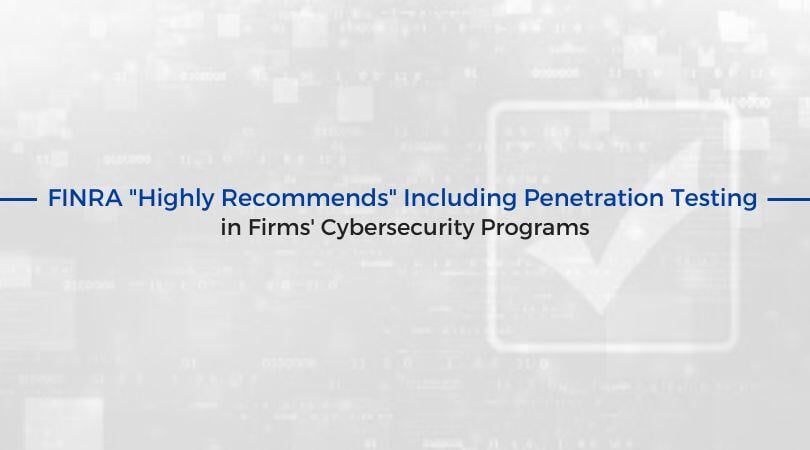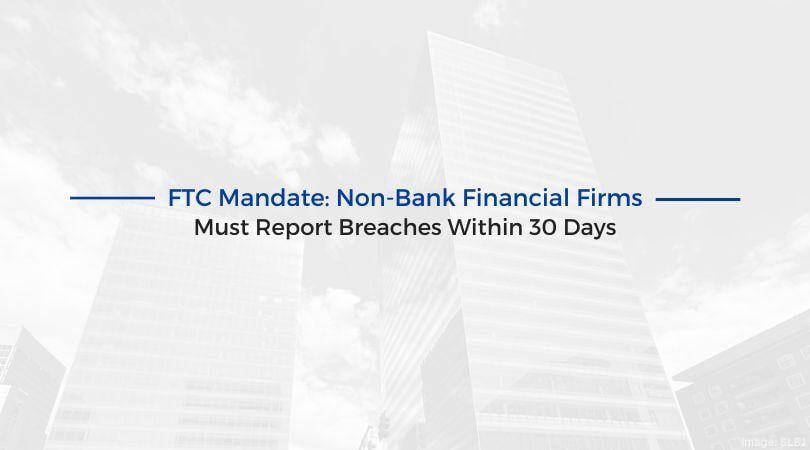Free FINRA Cybersecurity Compliance Program for Small Firms
FINRA, also known on the streets of Wall Street as the Financial Industry Regulatory Authority, is offering a free Cybersecurity Compliance Program...
2 min read
Megan Schutz : Updated on November 15, 2024

The need for robust cybersecurity measures has become paramount in the ever-evolving landscape of financial services. Financial institutions are entrusted with sensitive client information, making them attractive targets for cybercriminals. Recognizing this, the Financial Industry Regulatory Authority (FINRA) has taken a proactive stance by highly recommending the inclusion of penetration testing in firms’ cybersecurity programs.
Penetration testing, often referred to as ethical hacking, involves simulated cyber attacks on a system to evaluate its vulnerabilities and weaknesses. By mimicking the strategies employed by malicious actors, firms can identify potential points of entry and fortify their defenses accordingly. FINRA’s endorsement of penetration testing underscores its effectiveness in mitigating cyber risks and enhancing overall security postures. This blog will deep dive into FINRA’s recommendation and report on cybersecurity practices as well as best practices for initiating penetration testing in your firm.
The simple answer: no, FINRA does not require penetration testing. However, they highly recommend it, as detailed in their Report on Selected Cybersecurity Practices.
The report summarizes effective practices that firms have implemented to address select cybersecurity risks, acknowledging that there is not one universal solution but rather many different successful approaches.
The following list includes effective firm practices as observed by FINRA:
Ok, so if it’s not required, why is FINRA recommending penetration testing? Five key reasons.
1. Identifying Vulnerabilities: Penetration testing allows firms to uncover vulnerabilities in their systems, applications, and networks. By doing so, financial institutions can proactively address weaknesses before malicious actors exploit them, reducing the risk of data breaches and financial losses.
2. Comprehensive Risk Assessment: Penetration testing provides a comprehensive assessment of a firm’s cybersecurity posture. This goes beyond traditional security measures, offering insights into potential risks that may not be apparent through routine security audits.
3. Regulatory Compliance: With an increasing focus on regulatory compliance within the financial industry, penetration testing aligns with regulatory requirements and standards. Firms adhering to FINRA’s recommendations demonstrate a commitment to maintaining the integrity and security of their operations.
4. Enhancing Incident Response Preparedness: Simulating cyber-attacks through penetration testing helps firms refine their incident response plans. By exposing vulnerabilities and evaluating response mechanisms, financial institutions can enhance their ability to detect, contain, and recover from security incidents swiftly and effectively.
5. Client Trust and Reputation Management: In an era where trust is paramount, clients and stakeholders expect financial institutions to safeguard their sensitive information. Incorporating penetration testing fortifies cybersecurity and reinforces client trust, contributing to a positive reputation in the industry.
As you consider the strong recommendation to initiate penetration testing within your own firm, consider these best practices.
1. Regular Testing Cycles: Conduct penetration tests regularly to adapt to evolving cyber threats and ensure ongoing resilience against emerging risks.
2. Collaboration with Cybersecurity Experts: Engage with qualified cybersecurity professionals (like PK Tech) and firms specializing in penetration testing. Our expertise can provide valuable insights and recommendations for strengthening security measures.
3. Scenario-Based Testing: Emulate real-world scenarios during penetration testing to assess how effectively your firm’s defenses can withstand diverse and sophisticated cyber threats.
4. Continuous Improvement: Use the findings from penetration tests to drive continuous improvement in cybersecurity measures. Regularly update and enhance security protocols based on the evolving threat landscape.
FINRA’s strong recommendation for including penetration testing in firms’ cybersecurity programs reflects a proactive approach to addressing the dynamic nature of cyber threats in the financial industry. Financial institutions that embrace penetration testing not only enhance their security measures but also contribute to the overall resilience and integrity of the financial ecosystem.
If your firm is interested in initiating penetration testing – let’s chat. With a decade of experience working with the financial services sector, our team at PK Tech can help your firm establish a proactive cybersecurity stance. Schedule a free 15-minute call with a member of our team today.

FINRA, also known on the streets of Wall Street as the Financial Industry Regulatory Authority, is offering a free Cybersecurity Compliance Program...

If you are a TPA managing sensitive financial information, cybersecurity should be at the top of your priority list. We live in a world of growing...

In a significant move to bolster cybersecurity in the financial sector, the Federal Trade Commission (FTC) has recently implemented a new directive...